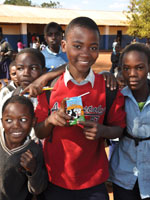Milk for Schools pilot programme launches in Zambia
Tetra Pak has partnered with Parmalat Zambia, the World Food Programme (WFP), the Zambian Ministry of Livestock and Fisheries Development and the Swedish International Cooperation Development Agency (Sida) to bring milk to 15 000 school children in 39 schools in Zambia's Eastern Province in a bid to stem malnourishment and poor school attendance.

The partnership brings 250ml packs of milk to children between the agees of 7 and 16, two to three times per week during one school year.
"Milk is recognised as being one of the most nutritious liquid foods available. It contains 14 of 18 of the nutrients humans need including vitamins, minerals, proteins, fats, sugars, and carbohydrates," says Stuart Bruder, key account director at Tetra Pak Southern Africa.
The project was officially launched in June 2011 in Nyimba District and has been distributing milk since then. The project aims to develop and test a feasible programme for bringing milk to schools across Zambia and ultimately to all children in schools.
"The project has had a very successful start. Schools and authorities are implementing the programme extremely well and are, with very few exceptions, following all of our recommendations in regards to programme execution protocols. School headmasters are very happy and told us attendance is 100% on milk days" says Markus Huet, school feeding programme implementation specialist with Tetra Laval Food for Development Office (FfDO), after having visited 14 schools and assessed programme implementation during the first month of the programme.
Home Grown School Feeding (HGSF) programme
WFP is implementing the milk programme as an integrated part of the recently launched and government led Home Grown School Feeding (HGSF) programme, which is included in the Sixth National Development Plan as part of the government's social protection strategy. The HGSF aims to reach almost one million students in 2011.
"There are plans to extend the milk programme to more schools, including private schools, and the programme represents a significant opportunity to the local industry and small holder farmers," says Bruder.
The total programme costs over US$1 million, of which Tetra Pak and its partners contributes half and Sida the other half. Much of the cost covers technical assistance for developing implementation and monitoring routines and development of a sustainable model to be rolled out across the country. The active involvement of the private sector is crucial for the programme to be sustainable.